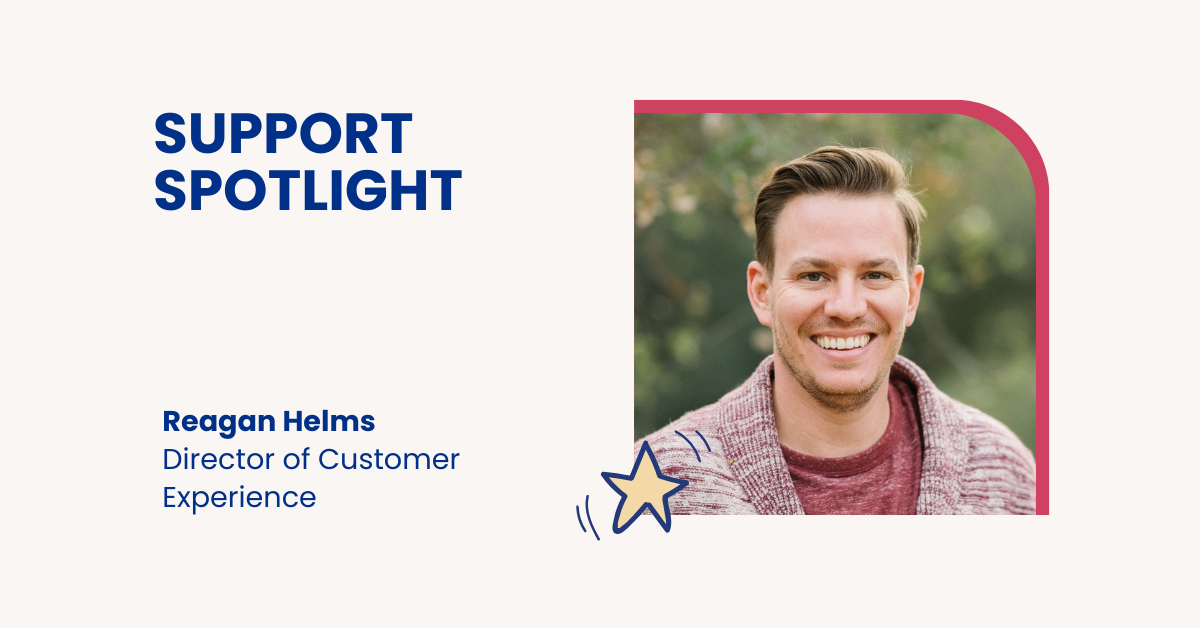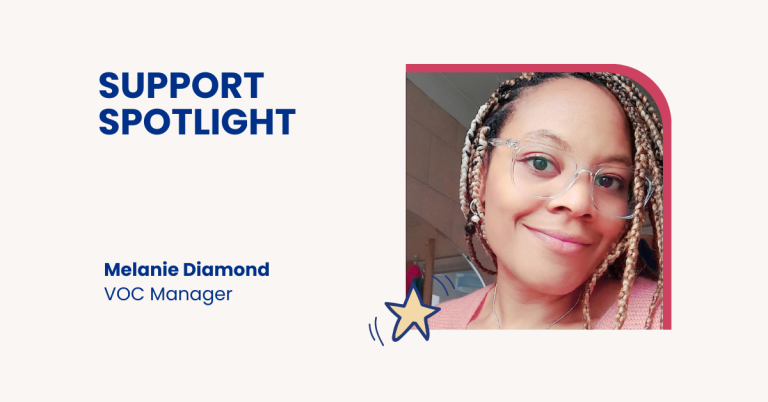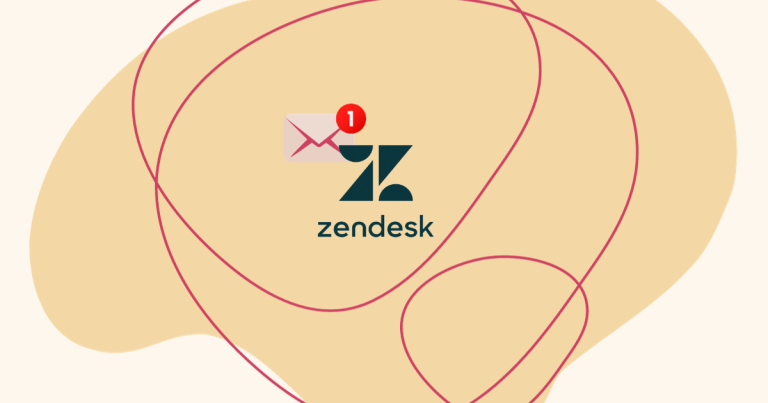We chatted with Planning Center’s Director of Customer Experience, Reagan Helms, about the evolving customer support landscape and the growing need for crafting roles that inspire people to do their best work.
Can you tell us your story? How did you end up working in customer experience?
I started working at my current company 13 years ago as a support agent. Back then, they were a startup, and I was a power user. When they needed someone to support the product, they asked me if I wanted to join them as a support agent. I was passionate about the product and what the results were for its customers. That’s what got me into it.
Moving forward 13 years later, as a Director of Customer Experience, what does your day-to-day look like?
It’s a lot more meetings than anything else. As director of the department, I work with 4 support managers, a documentation lead and a video training lead. So, my day-to-day work involves supporting these people and building a vision for where we want to take the department as a group. The rest of my time is spent collaborating with other department leads in the company, which means more meetings.
What about the agents? What’s a typical day for them at your company?
Our support agents work typically 8 to 5 in their time zone. And we like to give them time outside of the queue to further themselves as well. They typically have a one-on-one meeting with their manager every other week to discuss career development, personal growth, and their ticket performance and customer interactions.
We try to encourage our team to use their skills and learnings from working close to our customers to further the company as a whole. That can be through customer interviews, documentation writing, giving trainings or presenting product updates, for example. We try to prevent burnout by giving people something else than just solving tickets. That way they can feel they’re contributing to a bigger part of the problem than just typing on a keyboard. Ultimately, they are support agents and they do help customers and we do about 10,000 tickets a month on average with a one-hour reply time. They’re very efficient and good at what they do.
How do you approach coaching in your organization?
Even though our customer support department has a lot of retention we see it as an opportunity to lead to other jobs within the company. It could be on the product side, in a coordinating role, project management role or in our own department as a manager or trainer. We always try to coach agents into what they’re passionate about and enable them as much as possible to develop their skills and identify needs internally for those skills. It’s a lot of trial and error and we’re not as flexible as we would like to be, but we are more structured than probably most in how we approach this topic.
Going back to burnout prevention, how do you identify situations where your agents might be at risk of burnout? Do you have any process in place to track their wellbeing?
The primary way we do that is through one-on-one meetings. In those meetings, we discuss performance but also their overall wellbeing. Have they been absent more than usual? Have they been healthy? Are they feeling stressed? Are they feeling tired? Are they feeling like what they’re doing doesn’t matter? These observations help us spot signs of burnout or discontent with their day-to-day work.
In terms of performance, it depends on the role. For an entry-level agent, their ticket touches may not be as high as the rest of their team, or they may take longer to answer responses than other agents. But for a more senior agent, we might look at metrics differently, such as if they’re doing too much work. If their ticket touches are higher than the rest of their team, or if they’re answering responses very quickly, then the quality may suffer.
Why do they feel like they need to do more work? What are we not filling that time with instead of just crunching through the queue when it’s busy? Sometimes we do have busy seasons, but then what?
The same thing applies when coaching a new employee. What about their job makes them have to stop and ponder as much more than other agents do? Is it that they don’t have access to tools or knowledge that they don’t know exist? Is it that they are afraid to ask for help? Is it that they are second-guessing what they know, or maybe experiencing impostor syndrome? It really depends on having a relationship with that employee and understanding how they work, what motivates them at work, and then channelling that into how they do their work at your company.
You just mentioned dealing with impostor syndrome. How do you see that affecting your work and of those working in your team?
I believe that experiencing impostor syndrome is normal, and if you’re not feeling it, that could be concerning. Personally, I encounter it in some form every day. When hiring, I prefer people who challenge me to perform at my best. Being surrounded by talented, capable, and self-motivated individuals encourages everyone to excel. However, there can be an unhealthy level of impostor syndrome where constant self-doubt and second-guessing indicate that one may be in the wrong role.
As a leader, it’s okay to not have all the answers to a problem and seek help or advice from others in the community. Being a leader doesn’t mean having all the answers, and I often see people with impostor syndrome who feel they must know everything. Instead, being a leader means acknowledging that you don’t know everything and finding the best solution by utilizing your team’s ideas, seeking external resources, or acquiring knowledge and training.
How was your transition from support agent to the leadership role?
Fortunately for me, I was able to join a small company that was willing to take a chance on me as a new manager, team leader, and director. Although I had not previously held these positions, they trusted in my abilities and potential. However, this may not always be the case, and it depends on finding the right company and taking some risks. It is essential to do your best work, even if there may not be an apparent growth path for you. In my case, the opportunity arose from consistently performing my best in any role I had and when the company expanded and required a full-time person in that position, I had already been doing it for most of the time.
In all these years that you’ve worked at the Planning Center, you must have seen quite significant changes. What would you say are the biggest changes you’ve seen in customer support through the years?
At the beginning of my career, customer support was a catch-all term that encompassed various aspects that have since evolved such as customer experience and customer success. Although these concepts may differ for each company, they are now more defined than when I started. Customer success now involves a more personalized experience, like having an account representative, which was less common in the past. On the other hand, customer experience is a broader term that includes journey mapping and marketing.
Technology has also improved, making help desks more robust and integrating different tools more accessible through APIs. However, there are still companies that utilize AI as a shortcut to cut costs, resulting in bad customer experiences. Instead of merely trying to deflect tickets, it is better to utilize this technology to enhance agent performance. In my experience, there have been both positive and negative changes in customer experience since I started my career.
AI is particularly trending now with everyone talking about ChatGPT and how quickly it’s developing. Have you had any recent positive experiences of utilizing AI in customer support?
I haven’t experienced anything that has really wowed me yet, although I’m probably one of the harder people to get excited about this. But what excites me about ChatGPT is the augmentation of agent performance, not the replacement of it. I believe there are still many things that a human can do that an AI cannot, especially when it comes to critical or analytical thinking.
Many of our customer support interactions require diagnosing problems that an AI may not be able to solve easily. However, I have seen that there are tasks that a robot can do much faster and more efficiently than an agent, such as providing boilerplate text or summarizing a ticket interaction before sending it to a development or product team. It’s also great for getting people unstuck and filling in the blanks when an agent is having a hard time typing or explaining something to a customer.
What really excites me about ChatGPT is the opportunities it provides to improve agent performance, but for the customer, it shouldn’t feel like they are talking to a robot.
If you had a magic wand, what would you change in customer support?
If I had a magic wand, I would create a role that excites every agent that works for me because I value them all and don’t want them to leave. I know this is not possible, but there are people on my team who have great customer empathy that isn’t fully utilized in their current roles. I try to assign them to roles like doing customer interviews or on-site training, and those often require other skills like technical skills, public speaking skills, or writing skills that can be different from communicating with an individual.
Unfortunately, there’s no clear path for me to connect everyone with roles that truly excite them. My magic wand answer would be to create specialized roles for each person that fit their passion and interests so that they have no reason to leave.
To wrap up, what advice would you give to a young customer support professional to succeed in their career?
I believe that doing your best work doesn’t cost you anything. I understand it can be frustrating when you are starting in a new role and getting shut down with comments like “that’s not for you” or “don’t do that”. But by doing your best work consistently, you gain trust and opportunities to take on more responsibilities. You don’t need to force your way into a specific role or position. For example, when I started, our small team was in charge of all documentation and video training in addition to answering tickets.
Eventually, the company grew, and we needed someone to take on documentation full-time. Instead of hiring someone from outside the company, we decided to give the role to the agent who was most passionate about it and already understood the company’s vision. Taking a subtle approach can be appreciated by those in leadership and open new doors for career development.

Reagan Helms
Reagan Helms is the Director of Customer Experience at Planning Center, a company that provides software solutions to help churches and non-profit organizations manage their operations. With over a decade of experience in customer support, Reagan is passionate about creating exceptional customer experiences and ensuring customer satisfaction. He leads a team of customer support specialists, trainers, and documentation writers, and works closely with product development teams to advocate for customers and ensure their needs are met.
Did you like the post?
You might also like:

Surveypal
Everything you need to lead and improve your customer experience. Learn more at surveypal.com, or






